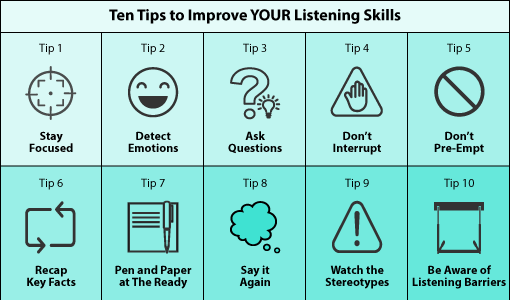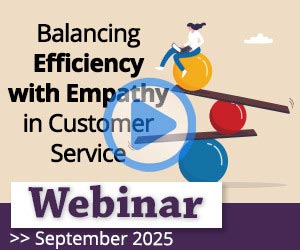Listening is one of the most underrated yet powerful skills in the contact centre. When done well, it builds trust, reduces repeat contact and leads to better outcomes for both customers and advisors.
In this article, Industry experts Christine Knott and Carolyn Blunt share their tips to improve listening skills, across your contact centre, along with our readers.
30 Ways to Improve Listening Skills Over the Phone
Here are some practical tips to help advisors sharpen their listening skills and build stronger connections with customers over the phone.
1. Cut Out the Noise and Tune In
Prevent yourself from being distracted by colleagues or external noises and concentrate on what your caller is saying.
It is also helpful if you, and the rest of the team, avoid shouting across the floor to lower background noise, or to wear binaural headsets (if possible!).
2. Use Probing Questions to Clarify
Ask thoughtful questions to dive deeper into the issue and ensure you fully understand the customer’s needs. By asking the right questions, like “When did this start?” you can tailor your response to find the best solution.
For examples of probing questions to use in customer conversations, read our article: 15 Examples of Probing Questions for Customer Service
3. Recognize and Respond to Emotions
Listen to the emotion in your caller’s voice. Does it match or endorse the words they are using?
If the customer sounds frustrated or upset, use empathy. If the customer sounds upbeat, try to hold onto that positivity by matching their tone.
4. Let the Customer Speak Without Interruption
You listen more effectively when you’re not talking, so refrain from interrupting your caller.
Remember to let the customer finish what they are saying, interruptions may break their train of thought. – you also have free reign to add anything or change to the sentences below if you think it is needed
To find out more about training your agents to Improve Active Listening in the Contact Centre, read our article: How to Train Active Listening in the Call Centre – With Exercises
5. Don’t Pre-empt What the Caller May Say
Avoid pre-empting what your caller is going to say, chances are you will be wrong and miss some of the content of their conversation.
This content may include some information that can be added to the CRM system to help the next advisor, who handles a call from this customer, to build rapport.
6. Recap to Confirm Understanding
Recapping key points during the conversation ensures you’ve understood everything correctly and reassures the caller that they’ve been heard.
Using phrases like “What I’m hearing is…” or “It sounds like you’re saying…” helps clarify important details and strengthens the connection with the customer.
7. Have a Pen and Paper to Take Notes
Have a pen and paper to hand and get into the habit of making short quick references to any questions you want to ask or points you wish to raise or comment on.
When your caller has finished speaking refer back to your notes and take action. If you are thinking of answers and responses whilst the caller is speaking, you are not listening.
8. Don’t Be Afraid to Ask for Clarity
If you are having difficulty listening, make the necessary adjustments. You might say, “I’m sorry I missed that last point. Please repeat that for me.”
It is better to ask the customer to repeat themselves than to guess what they wanted and pay for it down the line.
9. Keep and Open Mind to Avoid Assumptions
Avoid stereotyping individuals by making assumptions about how you expect them to act and what you expect them to say. This will bias your listening.
Remember that each customer is different and assuming a solution that is right for one customer will be the right one for another is not a great example of customer service.
10. Identify and Overcome Listening Barriers
Common barriers to effective listening include the urge to quickly provide a solution, jumping to conclusions, or focusing more on our own response than the customer’s words. Recognizing and addressing these barriers helps create a more productive and empathetic conversation.

Carolyn Blunt, the Managing Director of Ember Real Results, discusses what management can to do help improve listening skills on the contact centre floor.
11. Avoid Rushing to Solutions
Solution focused thinking is a process where the contact centre encourages advisors to focus on the resolution, because customers generally don’t wake up saying a “I want to phone a call centre” or “I want to send an email”. They’ve got a problem and it needs to be solved.
Experienced advisors will say “yeah I’ve seen this all before” and they’ll jump into a particular path of resolution. But, that might not be the right path for this particular customer.
So, this is where advisors should instead be encouraged to stop, check and think more openly. By doing this, the advisor may decide that for this particular scenario, the best course of action would be to take a step in a different direction.
12. Slow Down to Listen Better
There are occasions where contact centres will unwittingly encourage advisors to rush through calls, often through bad resource planning and metric choices, but some advisors will naturally just be wanting to “get through their work”.
This is where the contact centre needs to encourage the team to slow down, to breathe and to think about putting that focus on the customer. So, as Team Leaders and Managers, we need to really make sure we are facilitating that.
While it may seem counterproductive to slow an advisor down, it leads to a situation like the tortoise and the hare. This is because if an advisor were to rush through the call, it is likely that the customer is just going to call back.
13. Consider Whether There are Secret Narcissists in Amongst the Team
It is often good practise to ask advisors to think about who is the most important person in a contact centre conversation.
Just because of their nature, contact centres tend to attract people to work in them who are quite chatty, extroverted and bubbly.
While this can be great and good energy is needed through the advisor’s voice all day, if they really like the sound of their own voice too much, then it can get in the way of their ability to listen to the customer.
So, although the team might be really knowledgeable, let’s encourage these advisors to just use a bit more pull communication.
This is a strategy where the advisor asks lots questions, as opposed to push communication, which is to bombard the customer with information – whether they’ve asked for it or not.
14. Reduce Internal Chatter
nternal chatter is the little journey that people go off on in their minds, thinking about “other stuff”, because, in reality, we’ve all got “other stuff”.
This can include anything from “I hope my dogs okay” to “I wonder if my boiler will be repaired by the time I get home”. It is these thoughts that can be detrimental to an advisor’s listening ability.
So, one strategy to avoid doing this is to encourage advisors to have a “park pad”, which they can put notes into and then come back to them at the end of the day. It’s quite a cathartic thing to do, as it’s a strategy that helps to empty the mind.
15. Make Listening Fun with Games
Practise makes perfect, so consider playing listening games in every huddle and every free team meeting, no matter if it’s a quick 30 second quiz question or if it’s an actual activity. It’s essential to keep listening at the fore of what the team does.
Try having a makeshift “kitbox” that allows the contact centre to build up a repertoire of activities that can be used and brought out when call volumes are lower than expected.
For examples of activities that can be added to the “kitbox”, read our article: Motivational Games for Call Centres
16. Minimise Distractions For Better Focus
Quite often, contact centre operations have multiple systems – such as wallboards, on-screen communications and colleagues asking if people want a cup of tea – that cause all types of distractions.
These distractions may be influencing, how much are advisors listening to what the customer actually wants? Particularly if that call sounds just like those that have come directly before.
While some distractions are unavoidable, scheduling time to directly speak to the team, rather than repeatedly sending distracting emails, is one quick fix.
17. Rethink Metrics to Encourage Better Listening
When contact centre target advisors on time-based metrics, like Average Handling Time (AHT), then they may find that advisors try to “speed-up” the process.
When the team are doing this, advisors start to skip through things, meaning that they may not be listening properly and rush the customer away.
So, contact centres have got to be careful that the metrics they use are driving the right behaviours. An example of a great metric to use would be First Contact Resolution (FCR), as this can help drive really good listening skills because we want to encourage people to make sure that customers not going to contact again.
18. Consider Headset and Environment Adjustments
The construct of open-plan floors makes it quite difficult to listen closely to the customer at times, so contact centres often choose to consider the benefits of noise cancelling headsets.
Single earpiece, old headsets can be quite detrimental in terms of comfort, blocking out background noise and limiting distractions.
Wireless headsets are often the best option, so if the person next to the advisor is really distracting them and is being noisy, the advisor can get up move away, in order to focus directly on the customer.
For more ways to reduce background noise in your contact centre, read our article: How to Reduce Background Noise During a Call
19. Improve Resource Planning
If the contact centre has less advisors than it needs – whether that’s down to sickness, marketing sending out a campaign without warning or whatever – it creates problems that may impact an advisor’s listening ability.
When the contact centre is forced to deal with unexpected peaks in contact volumes, advisors can often be put under pressure.
So, when an advisor is informed of this great queue of customers, it can be a distraction and advisors may start to rush calls, which may influence their listening ability.
20. Think About Effective Two-Way Coaching Conversations
Active listening needs to start at the top of the organisation and it needs to be remodelled all the way through. This is ideally done by having effective coaching conversations with the team.
These coaching conversations would ideally involve advisors coming into the session and saying, “I really want to work on…”.
If the contact centre can motivate advisors to do this, to consciously process where the gaps in their customer interactions lie, the contact centre can help to create a culture of learning. Having this culture will result in the team sharing tips with one another, to help improve listening skills.
To find out the other advantages of this culture, read our article: 8 Benefits of Creating a Culture of Learning in Your Contact Centre
21. Recap the Call Before Saying Goodbye
At the end of the call, advisors should be asked to recap to the customer what they have done, what the customer needs to do now and will happen next to ensure they are clear.
Contributed by: Michael
22. Monitor Questioning Quality
In my contact centre, we monitor questioning quality. If questions are relevant to what has been said by the customer, then active listening has happened.
In terms of empathic responses, if an appropriate response has been given to what has been said by the customer, again active listening would have happened.
Also, when it comes to overall call control and quality of reporting, notes made during After Call Work (ACW) should match what customer has said.
Contributed by: Valerie
23. Encourage Self-Reflection
Self-reflection can be great. Before our quality analysts provide feedback on interactions, they encourage the agents to review their interactions first and consider:
- What they thought went really well?
- How they made the customer feel?
- What they could have done differently or better?
Also, if the advisor exhibited a great listening skill, discuss with them the good practice that they could share with the rest of the team.
Contributed by: Lenka
24. Create a Qualification That’s Based on Soft Skills
In our contact centre, we revisit listening and other soft skills regularly and use a customer service qualification that requires a demonstration of listening and communication skills. These include rapport, identifying customer needs, assessing expectations etc.
25. Focus on the Difference Between Needs and Expectations
Being able to tell the difference between needs and expectations is key to developing excellent listening skills. What is needed by the customer is not always what is expected by the customer.
So, contact centres need to encourage advisors to use questions to draw out customer expectations and explore customer needs.
Contributed by: Sarah
26. Ask the Advisors for Three Things They Know About the Customer
In coaching, when reviewing a customer’s call, ask the advisor what three things do they know about their customer.
Listening out for even the most random pieces of information about the customer can be helpful during an interaction, as it can be useful to know when building rapport and using small talk to avoid silences, when the line goes quiet.
Contributed by: Stephanie
27. Save Each Email as a Draft and Proofread Later
Listening is not just important on the telephone. When replying to a member via email/letter, type it, read it through, save in your draft and come back later with a clear head. This process may allow you to see something vital that you have missed.
28. Consider the Impact of Good Posture
If the advisor is slouching, their enjoyment and voice will likely mirror this. Whereas sitting up straight will makes them sound more engaged and confident/genuine in what you are saying. The customer will definitely be more likely to feel as though they are being listened to.
Contributed by: Claire
29. Treat Each Caller as an Individual
Treat each call individually and fully focus on the customer. The team would ideally know to address the customer by name, build rapport, to put themselves in the customer’s shoes and provide low effort, unique, inspiring customer service.
Contributed by: Kirstin
30. Focus on Reducing Staff Turnover
Turnover rates impact heavily on the listening skills of the contact centre floor. This is because there is inevitably a push towards product knowledge first and softer skills can get missed without good consistent peer to peer and other live call coaching support.
Contributed by: Jarleth
Find out how to lower advisor churn, by reading our article: Top 20 Ways to Reduce Attrition in Your Contact Centre
For more on improving listening skills in a contact centre, take a look at these articles:
- How to Train Active Listening in the Contact Centre – With Four Exercises
- Customer Service Skills: How to Improve Empathy, Active Listening and Knowledge
- How to Improve Your Customer Service Listening Skills
Author: Jo Robinson
Reviewed by: Hannah Swankie
Published On: 18th Apr 2018 - Last modified: 4th Apr 2025
Read more about - Hints and Tips, Carolyn Blunt, Christine Knott, Ember, Listening, Soft Skills
















